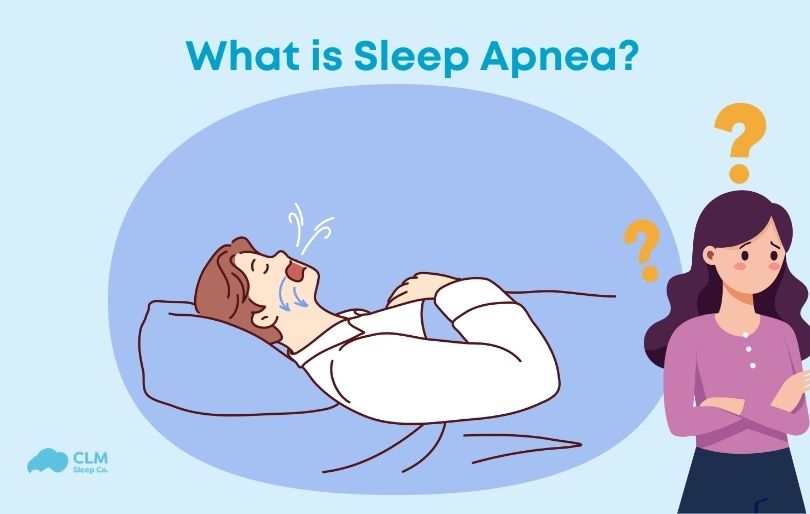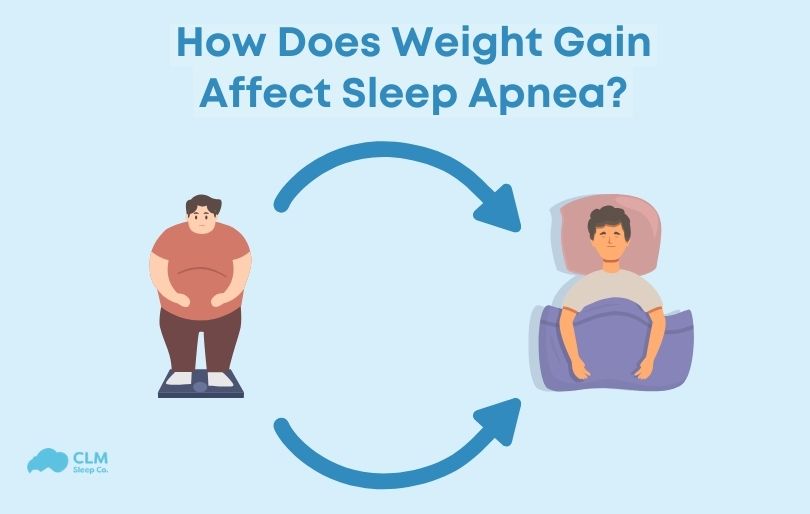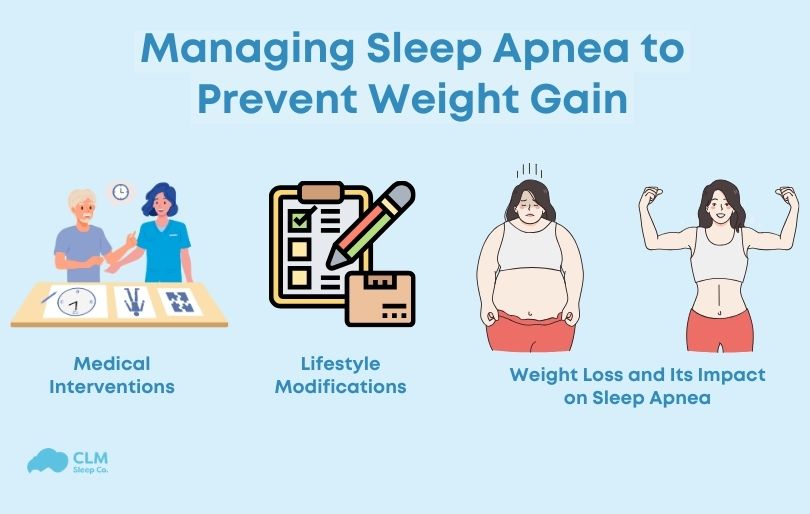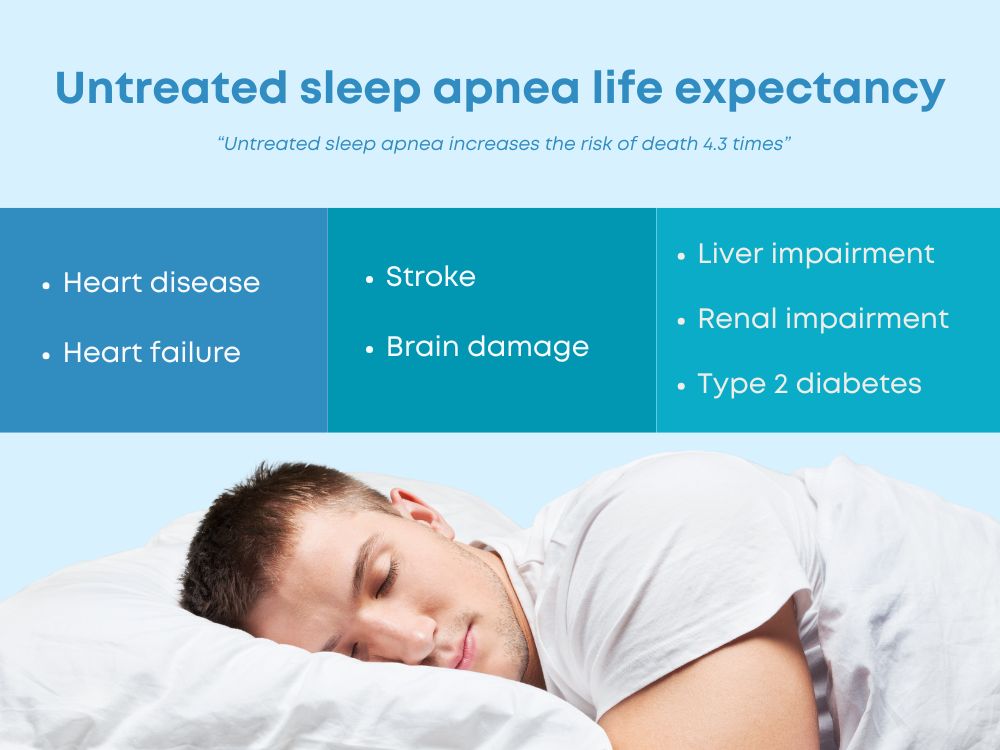Sleep apnea has much more to do with altered body weight than it does with being a sleeping disorder. It has been determined through studies that the condition, involving the repeated cessation of breathing during sleep, significantly disrupts hormonal processes by causing changes in appetite and reducing metabolism. These factors have created a cycle that does not favor weight management. A person must learn how sleep apnea leads to weight gain to break this cycle. In today’s article, we answer the question in light of expert opinion from CLM Sleep: Can Sleep Apnea Cause Weight Gain?
What is Sleep Apnea?
Sleep apnea is classified as a common sleeping disorder that encompasses normal breath pauses during sleep. It may include the following: partial or complete obstructions of the airway, normal breathing patterns at intervals, and interfere with the overall quality of sleep.
See more: 03 Types Of Sleep Apnea
Symptoms of Sleep Apnea
Symptoms of a patient suffering from sleep apnea may include:
- Loud snoring that interrupts the patient’s sleep and may also be accompanied by choking or gasping sounds.
- Daytime fatigue and extreme sleepiness.
- Morning headaches. In some cases, dry mouth may be reported as well.
- Difficulty concentrating or memory issues.
See more: Identifying Sleep Apnea Symptoms
Prevalence and Health Impacts of Sleep Apnea
Sleep apnea affects millions of people worldwide, and the most common form is obstructive sleep apnea (OSA). Studies indicate that some additional risk factors include males, people over 40, and those with obesity. If not treated, sleep apnea can be related to several very serious health concerns, such as:
- Increased risk of heart disease and stroke.
- Type 2 diabetes as a consequence of metabolic abnormalities.
- Psychological ailments including anxiety and depression disorders.
With these serious health risks, one might ask if sleep apnea causes weight gain. Several studies have found a substantial relationship between weight gain and sleep apnea; though, it is more based on its effects on the quality of sleep, metabolism, and hormonal changes.

See more: Guide to Sleep Apnea Test At Home: Quick and Easy
Why Does Sleep Apnea Cause Weight Gain?
Can sleep apnea cause weight gain? The Mechanism Sleep apnea leads to a disturbance in the body’s mechanisms, which results in some triggering factors for gaining weight: hormonal disturbances, changes in metabolism, and behavior led by poor sleep quality.
Hormonal Disruptions: Ghrelin and Leptin
Another major way sleep apnea can lead to weight gain is by playing a very naughty game with appetite hormones. As sleep apnea makes sleep quality poor, it increases ghrelin- the hunger hormone and decreases leptin- which is supposed to make you feel satisfied. This hormonal imbalance leads to increased hunger and overeating, into which high-caloric food especially fits, making management of weight much more difficult.
Impacts on Metabolism and Insulin Resistance
Chronic poor sleep due to sleep apnea slows down your metabolism, reducing the rate at which your body burns calories. In addition, interrupted sleep raises insulin resistance whereby the body loses the capacity to manage blood sugar levels; this also raises the prospect of type 2 diabetes and promotes storage fattening further facilitating weight gain.
Relationship Between Sleep Deprivation and Unhealthy Appetites
Sleep deprivation due to sleep apnea usually increases cravings for comfort foods with a high sugar and fat content. Lack of good sleep diminishes self-control and impairs decision-making, driving individuals toward comfort foods. Over time, these dietary habits act to perpetuate further weight gain in a vicious cycle of poor sleep and unhealthy eating.
Understanding these mechanisms is the first step to devising strategies to break the link between sleep apnea and weight gain.

See more: Can You Have Sleep Apnea Without Snoring?
How Does Weight Gain Affect Sleep Apnea?
Does sleep apnea cause weight gain? Weight gain and sleep apnea are in that classic vicious cycle of one condition feeding into the other, each worsening with time, till breaking free is almost impossible.
Excess weight, in particular, increases fat deposits in the neck and upper airway, which in turn narrows the airway and increases the likelihood of airway obstruction during sleep. This increases the frequency of interruptions in breathing, further reducing sleep quality.
In turn, the sleep disruption due to sleep apnea contributes to weight gain through changes in hormone levels, a slowdown in metabolism, and increased cravings for unhealthy foods. This creates a snowball effect, where both conditions continue to worsen over time.
Breaking this vicious cycle is important for overall health improvement since effective weight management can reduce the severity of symptoms of sleep apnea.

See more: Severe Sleep Apnea: Symptoms and Effective Treatment Options
Managing Sleep Apnea to Prevent Weight Gain
This vicious cycle between sleep apnea and weight gain can only be broken if both medical conditions can be addressed comprehensively.
Medical Interventions
- Continuous Positive Airway Pressure (CPAP): CPAP is usually administered to maintain open airways for better quality of sleep, reducing events of apnea.
- Oral Appliances: There are devices designed for repositioning the jaw and tongue to help in lessening mild to moderate sleep apnea.
Lifestyle Modifications
- Dietary Changes: Emphasize a balanced diet with a high intake of whole foods, lean proteins, and fiber for sleep apnea weight loss, and health.
- Regular Exercise: Physical activity helps not only in reducing weight but also in improving sleep quality.
- Sleep Hygiene: Maintenance of regular sleep schedule, limitation of screen time before going to bed, and comfort of the sleeping environment
Weight Loss and Its Impact on Sleep Apnea
Losing even a small percentage of body weight can significantly reduce the severity of sleep apnea symptoms, making it easier to manage the condition.

Conclusion of the article
In summary, the answer can sleep apnea cause weight gain? This is a complex relationship between disrupted sleep, hormonal changes, and metabolic changes. Sleep apnea affects not only your quality of life but also tends to make it hard for a person to maintain their weight, thus becoming a vicious circle to get out of.
The good news is, that with proper management—medical treatments and lifestyle adjustments—you can effectively address sleep apnea and avoid further weight complications. Don’t let sleep apnea control your health; take the first step toward better sleep and a healthier weight. For more information and expert advice, you can contact CLM Sleep for consultation and discover ways to manage your sleep and overall health today!
🏠 Contact information
Services: Diagnostic and treatment
Phone: 1300 256 753
Head office: 57 Fullarton RoadKent Town, SA 5067
The nearest location: Here
Store online: CPAPdiscount



